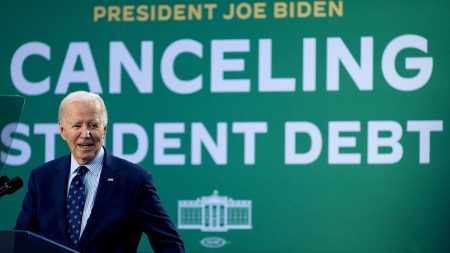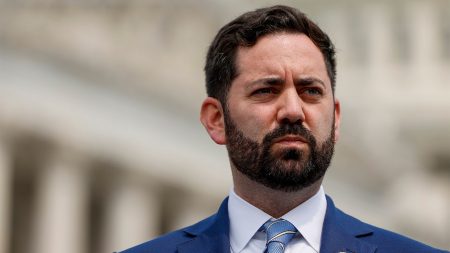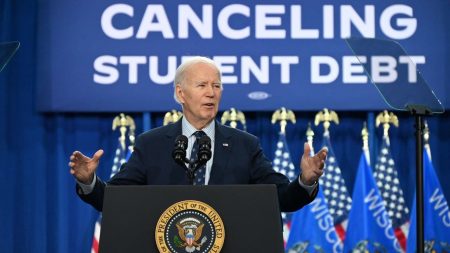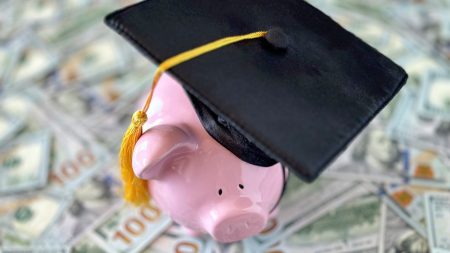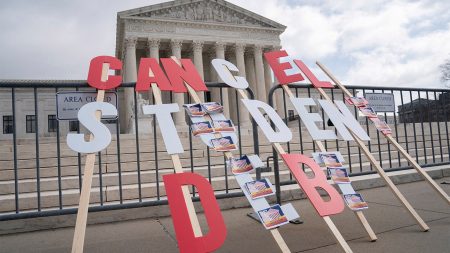Millions of older Americans at risk of defaulting on student loan payments may lose some of their Social Security benefits, Democratic lawmakers said in a letter urging President Joe Biden’s administration to act.
Sens. Elizabeth Warren, D-Mass., and Ron Wyden, D-Ore., were among several lawmakers who wrote to President Joe Biden about the risk student loan borrowers aged 65 or older faced when they defaulted on payments. Roughly 3.5 million Americans 60 and older hold over $125 billion in student loans, according to a 2023 report by the think tank New America that lawmakers cited. Nearly 40% of borrowers aged 65 and older with federal loans have defaulted.
Social Security beneficiaries risk losing up to 15% of their monthly benefits to pay off their outstanding loans under the Treasury Offset Program (TOP). TOP collects past-due (delinquent) debts (for example, child support payments) that people owe to state and federal agencies. Lawmakers want Biden to consider ending the practice of garnishing Social Security benefits to recover student loan debts.
“When borrowers are in collections, on average their Social Security benefits are estimated to be reduced by $2,500 annually,” the lawmakers wrote. “This can be a devastating blow to those who rely on Social Security as their primary source of income.”
If high-interest debt is getting in the way of your retirement savings, you could consider paying it down with a personal loan at a lower interest rate. Visit Credible to get your personalized rate in minutes.
SOCIAL SECURITY: COLA INCREASING BUT MEDICARE COSTS RISING TOO IN 2024
Income-driven repayment plan is one option
While no federal student loan forgiveness programs are specifically for senior citizens, Biden’s Saving on Valuable Education (SAVE) plan could lower borrowers’ monthly payments to zero dollars, cut monthly costs in half, and save those who make payments at least $1,000 yearly. This new IDR plan was announced after the Supreme Court struck down Biden’s student loan forgiveness plan.
Over $136 billion in student loans have been forgiven to more than 3.7 million Americans under the Biden Administration.
The latest block of forgiveness impacts borrowers, such as teachers, nurses, firefighters, and other individuals who earned forgiveness after 10 years of public service, the White House said in a statement. As much as $5 billion of student debt will be forgiven under the latest announcement, bringing the total number of people who have gotten their debt erased to over 3.7 million Americans.
Starting in February, borrowers with as few as 10 years of payments who initially took out $12,000 or less for college had their remaining debts zeroed as long as they were enrolled in the SAVE plan. As of early January, as many as 6.9 million borrowers had already enrolled in the SAVE Plan, with more than 3.5 million receiving at least $130 billion in student loan relief.
If you’re struggling with private student loan debt, you could consider refinancing to a lower interest rate. Visit Credible to speak with a student loan expert and get your questions answered.
MILLENNIALS ARE DESPERATE TO BUY A HOME, MOST WILLING TO PAY A MORTGAGE RATE ABOVE 7%: SURVEY
College debt hinders saving for retirement
Student loan payments have also hindered some Americans’ building retirement savings, particularly those with higher salaries, according to a report from the Employee Benefit Research Institute (EBRI).
Americans with student loan payments contribute at a lower rate and have smaller overall balances in their 401(k) accounts than those earning the same without student loan debt.
The savings disparity is most pronounced among those who earn $55,000 or more a year. The report said that the average contribution rate among these higher earners with student loan debt was 6.1% compared to the 7.3% saving rate of those who earned the same but did not have a student loan payment.
Americans earning less than $55,000 with student loans also contributed to their retirement savings at a lower rate of 5.3% compared to the 5.7% rate paid by those earning the same without the extra debt. When they could stop making student loan payments, 31.6% of employees increased their 401(k) contributions.
If student loans are preventing you from saving as much as you can for retirement, you could consider consolidating your private loans to a lower interest rate. Visit Credible to speak with a student loan refinance expert and see if this option is right for you.
THIS IS THE #1 CITY FOR FIRST-TIME HOMEBUYERS, AND OTHER HOT US HOUSING MARKETS
Have a finance-related question, but don’t know who to ask? Email The Credible Money Expert at [email protected] and your question might be answered by Credible in our Money Expert column.
Read the full article here




